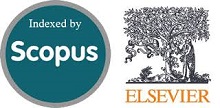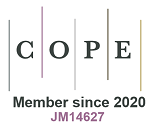Detection Sensitivity of a Modified EWMA Control Chart with a Time Series Model with Fractionality and Integration
Abstract
Doi: 10.28991/ESJ-2022-06-05-015
Full Text: PDF
Keywords
References
Shewhart, W. A. (1931). Economic control of quality of manufactured product. Macmillan And Co Ltd, London, United Kingdom.
Page, E. S. (1954). Continuous Inspection Schemes. Biometrika, 41(1/2), 100. doi:10.2307/2333009.
Roberts, S. W. (2000). Control chart tests based on geometric moving averages. Technometrics, 42(1), 97–101. doi:10.1080/00401706.2000.10485986.
Patel, A. K., & Divecha, J. (2011). Modified exponentially weighted moving average (EWMA) control chart for an analytical process data. Journal of Chemical Engineering and Materials Science, 2(1), 12–20. doi:10.5897/JCEMS.9000014.
Khan, N., Aslam, M., & Jun, C. H. (2017). Design of a Control Chart Using a Modified EWMA Statistic. Quality and Reliability Engineering International, 33(5), 1095–1104. doi:10.1002/qre.2102.
Sunthornwat, R., & Areepong, Y. (2021). Reproduction number, discrete forecasting model, and chaos analytics for Coronavirus Disease 2019 outbreak in India, Bangladesh, and Myanmar. Biostatistics & Epidemiology, 6(1), 31–47. doi:10.1080/24709360.2021.1960122.
Tatarkanov, A. A., Alexandrov, I. A., Chervjakov, L. M., & Karlova, T. V. (2022). A Fuzzy Approach to the Synthesis of Cognitive Maps for Modeling Decision Making in Complex Systems. Emerging Science Journal, 6(2), 368-381. doi: 10.28991/ESJ-2022-06-02-012.
Karevan, Z., & Suykens, J. A. K. (2020). Transductive LSTM for time-series prediction: An application to weather forecasting. Neural Networks, 125, 1–9. doi:10.1016/j.neunet.2019.12.030.
Jiang, Z., Tahmasebi, P., & Mao, Z. (2021). Deep residual U-net convolution neural networks with autoregressive strategy for fluid flow predictions in large-scale geosystems. Advances in Water Resources, 150, 103878. doi:10.1016/j.advwatres.2021.103878.
Khozani, Z. S., Banadkooki, F. B., Ehteram, M., Ahmed, A. N., & El-Shafie, A. (2022). Combining autoregressive integrated moving average with Long Short-Term Memory neural network and optimisation algorithms for predicting ground water level. Journal of Cleaner Production, 348, 131224. doi: 10.1016/j.jclepro.2022.131224.
Yang, Y., Yang, L., & Yao, G. (2021). Post-processing of high formwork monitoring data based on the back propagation neural networks model and the autoregressive—moving-average model. Symmetry, 13(8), 1543. doi:10.3390/sym13081543.
Schaffer, A. L., Dobbins, T. A., & Pearson, S. A. (2021). Interrupted time series analysis using autoregressive integrated moving average (ARIMA) models: a guide for evaluating large-scale health interventions. BMC Medical Research Methodology, 21(1). doi:10.1186/s12874-021-01235-8.
Yuan, X., Tan, Q., Lei, X., Yuan, Y., & Wu, X. (2017). Wind power prediction using hybrid autoregressive fractionally integrated moving average and least square support vector machine. Energy, 129, 122–137. doi:10.1016/j.energy.2017.04.094.
Franses, P. H. (2020). IMA(1,1) as a new benchmark for forecast evaluation. Applied Economics Letters, 27(17), 1419–1423. doi:10.1080/13504851.2019.1686115.
Burnecki, K., Kepten, E., Garini, Y., Sikora, G., & Weron, A. (2015). Estimating the anomalous diffusion exponent for single particle tracking data with measurement errors-An alternative approach. Scientific Reports, 5, 11306. doi:10.1038/srep11306.
Kacker, R., & Zhang, N. F. (2002). Online control using integrated moving average model for manufacturing errors. International Journal of Production Research, 40(16), 4131–4146. doi:10.1080/00207540210155800.
Luceno, A. (1995). Choosing the EWMA parameter in engineering process control. Journal of Quality Technology, 27(2), 162–168. doi:10.1080/00224065.1995.11979579.
Lee, S., Ahn, W. Y., & Kang, H. C. (2010). A Study on Forecasting Traffic Congestion Using IMA (Integrated Moving Average) of Speed Sequence Array. KSCE Journal of Civil and Environmental Engineering Research, 30(2D), 113-118. (In Korean).
Burnecki, K., Sikora, G., Weron, A., Tamkun, M. M., & Krapf, D. (2019). Identifying diffusive motions in single-particle trajectories on the plasma membrane via fractional time-series models. Physical Review E, 99(1), 12101. doi:10.1103/PhysRevE.99.012101.
Moffat, I. U., & Akpan, E. A. (2019). White Noise Analysis: A Measure of Time Series Model Adequacy. Applied Mathematics, 10(11), 989–1003. doi:10.4236/am.2019.1011069.
Knoth, S. (2021). Steady-state average run length(s): Methodology, formulas, and numerics. Sequential Analysis, 40(3), 405–426. doi:10.1080/07474946.2021.1940501.
Khan, M., Aslam, M., Anwar, S. M., & Zaman, B. (2022). A robust hybrid exponentially weighted moving average chart for monitoring time between events. Quality and Reliability Engineering International, 38(2), 895–923. doi:10.1002/qre.3021.
Zaman, B., Lee, M. H., Riaz, M., & Abujiya, M. R. (2020). An improved process monitoring by mixed multivariate memory control charts: An application in wind turbine field. Computers and Industrial Engineering, 142, 106343. doi:10.1016/j.cie.2020.106343.
Petcharat, K. (2022). The Effectiveness of CUSUM Control Chart for Trend Stationary Seasonal Autocorrelated Data. Thailand Statistician, 20(2), 475–488.
Peerajit, W. (2022). Cumulative Sum Control Chart Applied to Monitor Shifts in the Mean of a Long-memory ARFIMAX(p, d*, q, r) Process with Exponential White Noise. Thailand Statistician, 20(1), 144–161.
Petcharat, K., Sukparungsee, S., & Areepong, Y. (2015). Exact solution of the average run length for the cumulative sum chart for a moving average process of order q. ScienceAsia, 41(2), 141–147. doi:10.2306/scienceasia1513-1874.2015.41.141.
Sunthornwat, R., Areepong, Y., & Sukparungsee, S. (2017). Average run length of the long-memory autoregressive fractionally integrated moving average process of the exponential weighted moving average control chart. Cogent Mathematics, 4(1), 1358536. doi:10.1080/23311835.2017.1358536.
Sunthornwat, R., & Areepong, Y. (2020). Average run length on CUSUM control chart for seasonal and non-seasonal moving average processes with exogenous variables. Symmetry, 12(1), 173. doi:10.3390/SYM12010173.
Phanthuna, P., Areepong, Y., & Sukparungsee, S. (2021). Exact run length evaluation on a two-sided modified exponentially weighted moving average chart for monitoring process mean. CMES - Computer Modeling in Engineering and Sciences, 127(1), 23–41. doi:10.32604/cmes.2021.013810.
Phanthuna, P., Areepong, Y., & Sukparungsee, S. (2021). Run length distribution for a modified EWMA scheme fitted with a stationary AR(p) model. Communications in Statistics - Simulation and Computation, 1–20. doi:10.1080/03610918.2021.1958847.
Supharakonsakun, Y., Areepong, Y., & Sukparungsee, S. (2020). Monitoring the Process Mean of a Modified EWMA Chart for Arma(1,1) Process and Its Application. Suranaree Journal of Science and Technology, 27(4), 1–11.
Supharakonsakun, Y., Areepong, Y., & Sukparungsee, S. (2020). The performance of a modified EWMA control chart for monitoring autocorrelated PM2.5 and carbon monoxide air pollution data. PeerJ, 8, e10467. doi:10.7717/peerj.10467.
Supharakonsakun, Y. (2021). Comparing the effectiveness of statistical control charts for monitoring a change in process mean. Engineering Letters, 29(3), 1108–1114.
Spivey, M. Z. (2019). The art of proving binomial identities (1st Ed.). CRC Press, boca raton, United States. doi:10.1201/9781351215824.
Avazzadeh, Z., Heydari, M., & Loghmani, G. B. (2011). Numerical solution of Fredholm integral equations of the second kind by using integral mean value theorem. Applied Mathematical Modelling, 35(5), 2374–2383. doi:10.1016/j.apm.2010.11.056.
Shukla, S., Balasubramanian, S., & Pavlović, M. (2016). A Generalized Banach Fixed Point Theorem. Bulletin of the Malaysian Mathematical Sciences Society, 39(4), 1529–1539. doi:10.1007/s40840-015-0255-5.
Karoon, K., Areepong, Y., & Sukparungsee, S. (2021). Numerical Integral Equation Methods of Average Run Length on Extended EWMA Control Chart for Autoregressive Process. Proceedings of the World Congress on Engineering (WCE 2021), July 7-9, 2021, London, United Kingdom.
Liu, C. (2010). The essence of the generalized Newton binomial theorem. Communications in Nonlinear Science and Numerical Simulation, 15(10), 2766–2768. doi:10.1016/j.cnsns.2009.11.004.
Areepong, Y., & Peerajit, W. (2022). Integral equation solutions for the average run length for monitoring shifts in the mean of a generalized seasonal ARFIMAX(P, D, Q, r)s process running on a CUSUM control chart. PLOS ONE, 17(2), e0264283. doi:10.1371/journal.pone.0264283.
Phanthuna, P., & Areepong, Y. (2021). Analytical solutions of ARL for SAR(P)l model on a modified EWMA chart. Mathematics and Statistics, 9(5), 685–696. doi:10.13189/ms.2021.090508.
Suriyakat, W. (2020). On sensitivity of control chart for monitoring serially correlated data. Interdisciplinary Research Review, 15(3), 44-47.
Fusion Media (2022). Natural gas futures historical data. Available online: https://www.investing.com/commodities/natural-gas-historical-data (accessed on June 2022).
Fusion Media (2022). Crude oil WTI Futures historical prices 2018-2021. Available online: https://www.investing.com/commodities/crude-oil-historical-data (accessed on May 2022).
DOI: 10.28991/ESJ-2022-06-05-015
Refbacks
- There are currently no refbacks.
Copyright (c) 2022 Piyatida Phanthuna, Yupaporn Areepong






